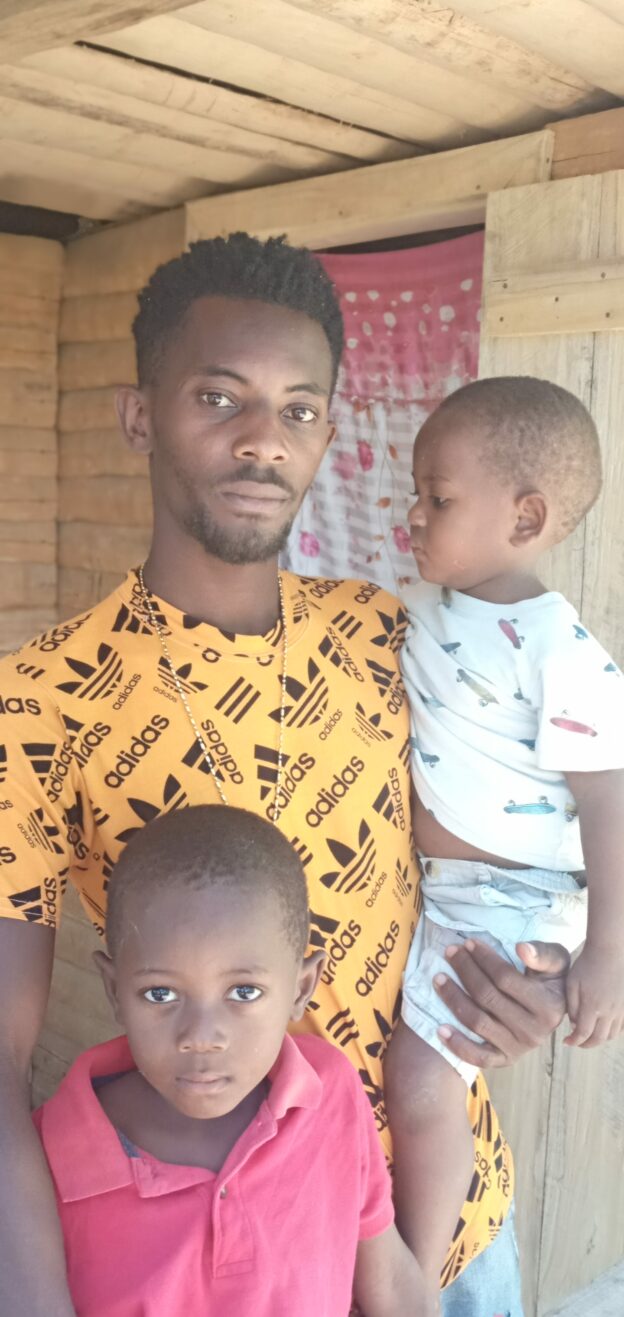Enel is now nearly twelve months into the CLM program. We wrote of him here, about six months ago. He is a single father, a widower left with two small boys. His wife was selected for the program, but she passed away a few months after the couple joined it.
At the time, he was thinking that the best option for him would be to find work with his brothers-in-law in Pòtoprens. They work in construction. He had a couple of young men living in his house with him and the boys, and they said they would take care of his livestock while he was gone. He knew he could leave the boys with his mother.
But when he finally got to Pòtoprens, the work had been completed. There was no job for him. And when he got back to Ramye, he found the livestock in a bad state. The guys had not taken care of the animals as they said they would. He doesn’t really blame them. Living under his roof, they expected he would do more to keep them fed, and he just wasn’t able to. So they were much more focussed on looking for odd jobs than on helping him.
Because of the CLM program, there was a fair amount of construction going on in his neighborhood, and though Enel couldn’t get a job as a builder, he found that he could get hired to turn palm trees into the planks that local residents use to wall-in their homes. The job typically pays 1750 gourds for a tree, and though he didn’t get a lot of those jobs, he got some. “I would save 250 gourds each week in my [Village Savings and Loan Association], and if I had been paid for a tree, I’d take 500, and leave 250 in the VSLA’s box to add to savings the next week.” But as local CLM-funded construction nears completion, those jobs are drying up, and so Enel needs to make his next plan.
He’s done reasonably well, but not spectacularly well, with his livestock. Fonkoze gave him two goats, and he now has five. One of the two had a pair of kids, and he bought an additional adult female himself. The other of the two he initially received is now healthy after Enel spent a couple of months nursing it back to health after it injured its foot. Finally healthy, it might now, he believes, be pregnant. His sow is healthy and nearly ready to give birth its first litter.
A successful litter of piglets would be a huge victory. The area is in the midst of an epidemic of pig disease, so much so that many CLM members who wanted pigs decided against risking one after all. Managing his so that it remains healthy has involved careful attentiveness and a large amount of luck. If he is able to raising a litter, even just until the piglets are weaned, it will me a large infusion of cash into his household.
Purchasing the extra goat took smarts. He had received cement from the program to build up a small protective barrier around the base of his home’s walls, but it was too little to do the job. Rather than waste it with a useless half-measure or let it harden in the sack while he saved up to buy the rest of what he’d need, he sold it and used the proceeds to buy the goat.
The useless trip into Pòtoprens convinced him that he is better off, at least at present, creating an activity near where he lives. But it isn’t a simple matter. The natural thing would be for him to start up a small commerce, but that usually takes capital, and he doesn’t feel as though he has any right now, especially as he faces the expense of getting his older boy off to school for the coming year. He could sell livestock and invest the proceeds, but it is a very unfavorable moment to sell. With the start of the school year, the markets are full of livestock being sold to pay school fees and associated expenses, so the prices are especially low.
He knows the business that appeals to him. He’d like to buy and sell livestock. If he turns out to be a good negotiator and knows his livestock well, he can buy and sell several times with the same money every time he goes to the market. In addition, he’s proven by his care for the sick goat he owns that he knows how to nurse a goat to health. He could make money buying goats that are in poor condition, taking care of them for a few weeks or for as long as it takes, and reselling them when they have regained value.
The one source of capital potentially available to him is his VSLA. He could either take out a loan at one of its upcoming weekly meetings or wait until December, when its one-year cycle will end, and he’ll get his annual pay-out. He has been scrupulous about saving the maximum amount, 250 gourds, every week, even when it has meant asking around for charity, so he will have between 13,000 and 15,000 gourds, depending on the amount of interest the group generates. If he waits, he will be able to get started without a loan, but he’ll be entering the market at the time of year when livestock is most expensive. And he’s sick of his lack of a reliable income, tired of asking his sisters for help, and unhappy with the days he wastes doing nothing.
Still, it is a difficult choice, one he wants to discuss further with his case manager.
